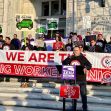NYC app-based delivery workers from DoorDash, GrubHub, Uber and Relay hoped to get a pay bump to $17.96 per hour for their deliveries on July 12, but they were quickly disappointed. The new wage was supposed to go into effect on July 12 as per an expected agreement with the city of New York, but one day later, on July 13, a judge surprised the workers and ordered an injunction to stop the new mandate.
Instead of the pay bump on July 12, the app delivery workers lost their bid when a judge’s order stayed the rule to keep the wage well under the new $17.96 per hour.
New York State Supreme Court Justice Nicholas Moyne ruled that the workers’ wage increase could not take effect before July 31, when oral arguments on a temporary injunction would be heard. The New York City Department of Consumer and Worker Protection, a defendant in the lawsuits, now has until July 24 to submit its documents in the case to the court.
Numerous delivery companies had argued that the higher minimum hourly wage would hurt their businesses and also harm their workers. The companies, including DoorDash, Uber Eats, Grub Hub, Relay and others convinced the judge to stay the order for an increase in hourly wages.
In reality, there is a twist to the legally mandated minimum wage pay in New York City, which is set at $15, for the delivery workers. They do not get paid per hour, but instead, per delivery.
The over 60,000 delivery workers in New York City, paid by delivery and not by the hour, are not earning the $15 minimum wage per hour. Instead, the City of New York estimates that the app delivery workers' wages only amount to about $7.09 per hour, before tips.
The proposed new wage rule for app delivery workers would give them a minimum wage of $17.96 an hour and not base their pay upon a per-delivery system. When city officials announced the new wage increase in June, they said they expected the amount to increase to about $25 per hour by 2025.
Pay for app-based delivery workers is a growing national issue. Business for food delivery and takeout in the U.S. is booming. The same-day delivery market is expected to grow at 20% over the next ten years and is projected to reach $42.26 billion in 2032, dramatically higher than the $6.66 billion in 2022.
In the app delivery companies’ lawsuits, brought by Uber, DoorDash, GrubHub, and Relay, attorneys argued that New York City used false or inaccurate data to calculate the new compensation of $17.96 per hour. The companies also alleged the survey undertaken among their delivery workers was unreliable.
“We hope that this puts us on the path toward the city establishing a more reasonable earnings standard that reflects how these platforms are used by New Yorkers,” DoorDash said in a public statement.
In New York City, app delivery workers are everywhere and are often more prominent than pedestrians as they ride on scooters or bicycles in bike lanes, or hoof it in midtown, to bring many thousands of hungry clients food at all times of the day or night.
Vilda Vera Mayuga, the New York City Department of Consumer and Worker Protection commissioner, said she was dismayed by the judge’s decision.
“We look forward to a quick decision so that the dignified pay rate that workers deserve to earn is not delayed any more than necessary,” said Ms.Mayuga.
In the city that never sleeps, the court’s ruling on July 30 could impact the nation, as millions of hungry Americans who click on an app to get food delivered are now accustomed to fast, convenient and inexpensive charges for food.






